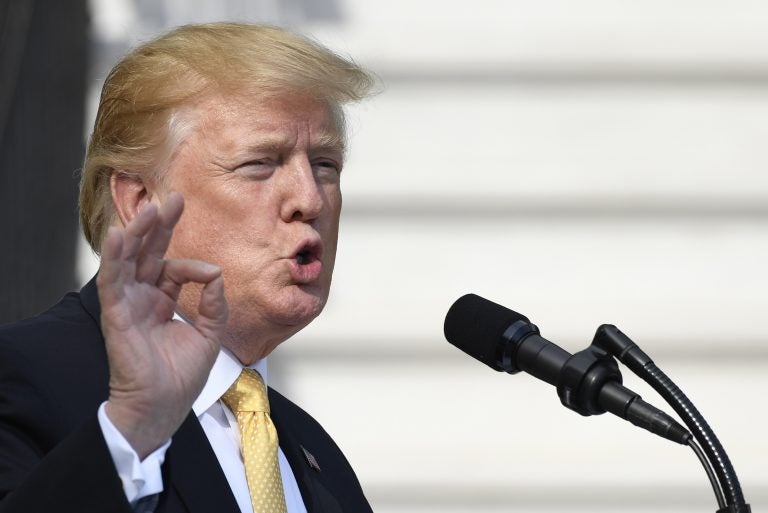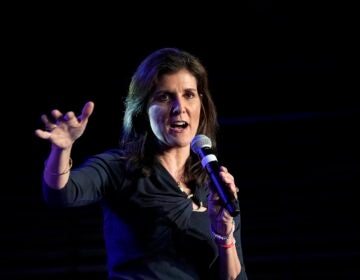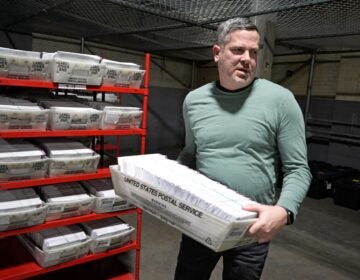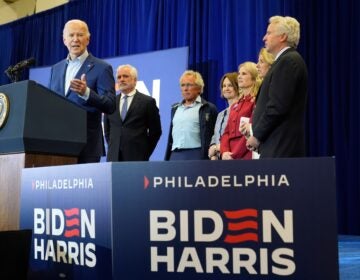Trump tells NRA he’s withdrawing from arms trade treaty
President Donald Trump said Friday he is withdrawing the U.S. from an international agreement on the arms trade.

In this April 25, 2019, photo, President Donald Trump speaks on the South Lawn of the White House in Washington. (Susan Walsh/AP Photo)
With pro-gun legislation largely stalled in Congress, President Donald Trump said Friday he is withdrawing the U.S. from an international agreement on the arms trade, telling the National Rifle Association the treaty is “badly misguided.”
Trump made the announcement as he vowed to fight for gun rights and implored members of the nation’s largest pro-gun group — struggling to maintain its influence — to rally behind his re-election bid.
“It’s under assault,” he said of the constitutional right to bear arms. “But not while we’re here.”
Trump said he would be revoking the United States’ status as a signatory of the U.N. Arms Trade Treaty, which regulates international trade in conventional weapons, from small arms to battle tanks, combat aircraft and warships. President Barack Obama signed the pact in 2013 but it has never been ratified by U.S. lawmakers.
It has long been opposed by the NRA.
“Under my administration, we will never surrender American sovereignty to anyone,” Trump said, before signing a document on stage asking the Senate to halt the ratification process. “We will never allow foreign diplomats to trample on your Second Amendment freedom.”
“I hope you’re happy,” he told the group, to cheers.
His move against the treaty came as Trump sought to excite an organization that was pivotal to Trump’s victory in 2016 but, three years later, is limping toward the next election divided and diminished.
“You better get out there and vote,” he said, telling the crowd of thousands that the 2020 election “seems like it’s a long ways away. It’s not.”
Gun activists denounced the treaty when it was under negotiation as an infringement of civilian firearm ownership, despite the well-enshrined legal principle that says no treaty can override the Constitution or U.S. laws. The treaty is aimed at cracking down on illicit trading in small arms, thereby curbing violence in some of the most troubled corners of the world.
Advocates of tighter gun restrictions denounced Trump’s decision. Kris Brown, president of the Brady organization, said it was a “reckless move” that will “only embolden terrorists and other dangerous actors around the world.”
In a speech full of grievance, Trump railed against the Russia investigation, which did not establish a criminal conspiracy between Russians and the Trump campaign. Special counsel Robert Mueller outlined potential episodes of obstruction of justice by the president without concluding that he had committed any crime, leaving such questions for Congress to pursue as it saw fit.
“They tried for a coup,” Trump said. “It didn’t work out so well.”
“And I didn’t need a gun for that, did I?” he quipped, adding: “Spying. Surveillance. Trying for an overthrow? And we caught ’em.”
And in a preemptive attack against his 2020 Democratic challengers, Trump claimed without evidence that the other party wants “to take away your guns.”
An emboldened NRA had high hopes and ambitious plans for easing state and national gun regulations after pouring tens of millions of dollars into the 2016 presidential race, seeing its dark horse candidate win and Republicans in control of both branches of Congress.
But much of the legislation the group championed has stalled, due, in part, to a series of mass shootings, including the massacre at a Parkland, Florida, high school that left 17 dead and launched a youth movement against gun violence that has had a powerful impact. And Democrats won control of the House in the midterms.
At the same time, the group is grappling with infighting, bleeding money and facing a series of investigations into its operating practices, including allegations that covert Russian agents seeking to influence the 2016 election courted its officials and funneled money through the group.
As Trump landed in Indianapolis, a judge imposed an 18-month prison term on gun rights activist Maria Butina, an admitted Russian agent who tried to infiltrate American conservative groups.
The NRA’s shaky fortunes have raised questions about the one-time kingmaker’s clout heading into 2020.
“I’ve never seen the NRA this vulnerable,” said John Feinblatt, president of Everytown for Gun Safety, a nonprofit that advocates for gun control measures.
With Trump in office, gun owners no longer fear the Second Amendment is under attack to the extent it was perceived to be under Democrats.
“Good times are never good for interest groups because it’s much better when Armageddon is at your doorstep,” said Harry Wilson, a Roanoke College professor who has written extensively on gun politics. “Fear is a huge motivator in politics.”
The NRA, said Adam Winkler, a UCLA law professor and expert on gun policy, has also dramatically changed its messaging over the last two years, with its NRATV service advocating a panoply of far-right political views that have turned off some members.
At the same time, public sentiment has shifted. A March AP-NORC poll found that 67% of Americans overall think gun laws should be made stricter — up from 61% in October 2017.
And a June 2018 Gallup poll found overall favorable opinions of the NRA down slightly from October 2015, from 58% to 53%. Unfavorable views have grown, from 35% to 42%.
Against that backdrop, Democratic politicians have become more comfortable assailing — and even actively running against — the NRA and pledging action to curb gun violence. And gun control groups like Everytown, which is largely financed by former New York City Mayor Michael Bloomberg, and a political action committee formed by Gabby Giffords, the former Arizona congresswoman wounded in a shooting, have become better organized and more visible, especially at the state level.
That reversal was made clear during the 2018 midterm elections, when those groups vastly outspent the NRA.
During the midterms the NRA “committed almost a disappearing act,” said Everytown’s Feinblatt.
Winkler, the UCLA law professor, allowed that the group had scored some victories under Trump, including the appointment of two Supreme Court justices who may be open to striking down gun laws.
But overall, he said, “On the legislative front, the NRA has been frustrated,” with priorities like national reciprocity for conceal carry laws and a repeal of the ban on silencers stalled.
Instead, Trump introduced a new federal regulation: a ban on bump stocks after a man using the device opened fire on a crowd of concertgoers on the Las Vegas strip, killing 58 people and wounding hundreds.
Associated Press writers Laurie Kellman, Brian Slodysko, Emily Swanson and Hannah Fingerhut contributed to this report from Washington.
WHYY is your source for fact-based, in-depth journalism and information. As a nonprofit organization, we rely on financial support from readers like you. Please give today.




